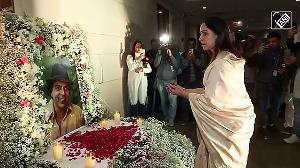 A 91-year-old top leader of the fundamentalist Jamaat-e-Islami was sentenced to 90 years in jail on Monday by a special Bangladeshi tribunal for masterminding atrocities during the 1971 war of independence against Pakistan.
A 91-year-old top leader of the fundamentalist Jamaat-e-Islami was sentenced to 90 years in jail on Monday by a special Bangladeshi tribunal for masterminding atrocities during the 1971 war of independence against Pakistan.
Ghulam Azam, the Jamaat-e-Islami supremo who has left deep emotional scars in the collective national psyche by engineering war-time atrocities in 1971, was found guilty by the International Crimes Tribunal on five charges including murder and torture. He had been charged with 61 counts of crimes in those five categories. This was the fifth and possibly the most awaited verdict on the war crimes cases.
"Ghulam Azam's case is a unique one. Ghulam Azam was not physically present during these crimes but he has been accused of being the main man and the overseer of the war crimes during 1971," Justice A T M Fazle Kabir, chairman of the three-member International Crimes Tribunal-1, said.
"He will serve 90 years in jail," Kabir said, as the panel pronounced the operative part of an abridged 75-page judgment in the crowded courtroom.
The judgment, however, said Azam deserved the death penalty for the crimes he had committed siding with the Pakistani junta but his old age and physical condition forced the panel to deliver the 90-year jail term.
Azam, the then chief of the East Pakistan wing of the Jamaat-e-Islami party was present as the tribunal delivered the crucial verdict. He was "found guilty of all the charges" in course of the trial during the past one year.
During the reading out of the sentence, a second judge, Justice Anwarul Haque, gave the summary of arguments in the case that ended on April 17.
Justice Haque analysed whether or not crimes against humanity at all took place in the various parts of Bangladesh or not. "The 'massive genocide' in 1971 is the worst after World War II," Haque was quoted by BD News as saying.
"It can only be compared to the genocide committed by Nazis," he said. "And that genocide was committed by Pakistan and their collaborators in this country." Then Justice Hossain took over and started reading out the rest of 75-page summary verdict.
Azam, standing in the dock, quietly awaited judgment as all three judges made statements one after another. A provincial minister in 1971, he was wheeled in to the courtroom for the verdict.
Azam was brought to the International Crimes Tribunal complex in an ambulance from the nearby specialized Bangabandhu Sheikh Mujib Medical University Hospital where he has been kept under jail custody since his arrest last year. The tribunal had earlier ordered jail authorities to take necessary steps to ensure Azam's appearance in the court on Monday, rejecting his counsel's plea not to pronounce the verdict in his presence. He made a feeble protest when the verdict was being read out.
Azam is the fifth Jamaat-e-Islami politician to be convicted by the International Crimes Tribunal since the trial of war crimes suspects, mostly belonging to the Islamist group, began three years ago. In the first verdict of the tribunal in January, former Jamaat leader Abul Kalam Azad was sentenced to death on similar charges.
Another Jamaat leader Abdul Quader Mollah was sentenced to life in February for atrocities during the war. In late February, Delwar Hossain Sayedee, vice-president of the party, was sentenced to death for committing "crimes against humanity" during the 1971 war.
On May 9, the tribunal handed down death penalty to fundamentalist Jamaat-e-Islami stalwart Muhammad Quamaruzzaman for "crimes against humanity" he committed during the war. The verdict came, even as Jamaat-e-Islami today enforced a violent nationwide general strike.
Dozens of people, including reporters and policemen, were injured as Jamaat activists exploded scores of crude bombs and set nearly a dozen vehicles on fire ahead of the verdict, police said. It was Bangaldesh Prime Minister Sheikh Hasina's government that formed the tribunal in 2010 to try the alleged collaborators of 1971.
The main opposition Bangladesh Nationalist Party led by former PM Khaleda Zia has criticised it, saying it was meant to weaken the opposition. Jamaat-e-Islami is the main political ally of the BNP.
Azam was indicted on May 13 last year while the prosecution called him the "top collaborator" of Pakistani junta. But in a long "political statement", Azam rejected the war crime charges, calling them "politically motivated" as the tribunal asked him if he was "guilty or not".
Azam's party opposed Bangladesh's 1971 independence with many of its activists joining the auxiliary forces of the Pakistani troops. He was stripped off his nationality as he fled the country at the fag end of the Liberation War but got it back after a long legal battle on his return home in 1978 when he also resumed his position as the "ameer" or head of the JI in independent Bangladesh.
Officially, three million people were killed in the war by the Pakistani army and their Bengali-speaking collaborators during the 1971 Liberation War. Most of Jamaat top leaders of that time were accused of siding with Pakistani troops constituting militia and auxiliary forces like Razakar and Al Badr to carry out atrocities.
In the past several months, the party has spearheaded violent campaigns to thwart the trial of their stalwarts. Deadly clashes over the war crimes trial have left over 100 people, including policemen, dead. Since the constitution of the first war crimes tribunal three years ago, 12 people were indicted so far, including nine Jamaat leaders, two of the main opposition and Jamaat's ally BNP and one being a junior leader of the ruling Awami League.








